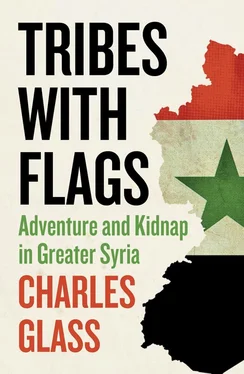Hind’s sister asked the maid to bring us cups of tea, and Tanzi showed me his letters of recommendation from American companies he had represented, as well as photographs of his son’s graduation from Illinois State University. This son lived in Chicago; his daughter lived in Istanbul, where she worked as an economist; only one child, a son who worked as an engineer, lived in Alexandretta. His English, like Hind’s and her sister’s, was fluent. The maid carried in the tea, which, unusually, was served in china cups. Tanzi talked about Alexandretta, where he had been born under the French Mandate. “For a married couple,” he said, “life is pleasant. For a single person, it depends on whether he has friends. There’s nothing special here.”
I asked him about 1939, the year Alexandretta ceased to be a part of Syria. “Maybe twenty-five per cent of the people living in Iskenderun at that time left,” he said. “They were the minorities, if you’d like to say, the Christians.”
“You’re Christian. Why did you stay?”
“Because we didn’t feel anything. It was everything regular. Nothing special.”
“Did you speak Turkish then?”
“Yes, but not as good as now. The mother tongue is Arabic.”
“How does life here compare with life in Syria?”
“We hear that life is more pleasant here. There is a big shortage of consumer goods there. The administration is much more democratic here.”
“Can you travel to Syria easily?”
“I think it’s difficult to get a Syrian visa. Previously, we used to get it at the border. Now, we have to go to Ankara.”
“Do any Arabs want this to be part of Syria?”
“Even if there are feelings,” he said, “no one here would express them.”
“Syria claims Alexandretta. Does that mean anything?”
Tanzi began to answer, but was interrupted by his guest, Georges Sayyegh, who had until then been playing chess with Hind and now insisted on playing chess with me. I explained I had come not to play chess, but to talk. Another man arrived to play bridge. Hind asked me whether I would like to see a videotape of her MBE investiture at the British Embassy in Ankara. She put on the video, which showed her in a crowded reception in the grand surroundings of the Embassy. She looked happy and shy, like a little bird escaped from her cage in Alexandretta excited to find her way to the flocks in Istanbul. The ambassador delivered a speech in which he complimented “Hannoud Alexander” on her years of service to British subjects in trouble. When the tape ended, she showed me the MBE. “Why did he call you Hannoud Alexander?” I asked.
“That was my name,” she explained, “before we had to change.”
“You had to change your name? Why?”
“When this area was ceded to Turkey, everyone had to take a Turkish name.”
The maid came back into the room, carrying a sweet cake which she put in front of me. I thanked her in Arabic, and she went back to the kitchen embarrassed. Sayyegh then insisted we have a game of chess. We played in silence for nearly an hour until I conceded. Sayyegh, having destroyed any chance I had of conversation with this older generation of Alexandrettans, stood up without a word and walked into the next room. There, the three old men were preparing the cards for a game of bridge and called me to play with them. I admitted I did not know how.
Another afternoon, I went to Hind’s apartment to visit her and her two sisters. They had just eaten lunch, but she told me to sit down at her dining table while she prepared something. She brought me salad, cheese, bread and kibbé, a traditional Syrian mixture of minced lamb and cracked wheat. It was perfect lunch, exactly the food my grandmother would give me when I was young and would drop in on her unexpectedly. Hind and her sisters had lived in the apartment with their mother, who had died a year earlier, when they were girls. All three still dressed in black. Hind was the only spinster, one sister was married to Tanzi and the other to a Lebanese. She was staying with Hind while she recovered from a broken hip. She and her husband lived in a flat on the fifth floor of an apartment building in Sin el Fil, part of Christian east Beirut. With all the electricity cuts, which put the lift out of action, she had become a prisoner.
The sister recalled that the Sin el Fil area had suffered until 1976 from attacks by the Palestinians in the nearby refugee camp at Tel el Zaatar.
“I remember Tel el Zaatar.” I said. “I covered the massacre there.”
“You remember the massacre, but you don’t know that the Palestinians killed every young Christian man they found. When the camp was taken, they found Christians crucified in the cellars.”
“I went into the camp the morning it fell,” I told her. “All I saw were the bodies of Palestinians trampled underfoot by Christians looting the houses. If there had been crucified Christians, I’m sure the Christian militiamen would have shown them to us.”
“We lived with them,” she said sadly. “Until 1973, when the first fighting began between the Palestinians and the army, we lived on the Corniche.” The Corniche runs along the seafront in Muslim west Beirut between the American University of Beirut and Raouche, a Marseilles-like quarter of flashy apartment buildings, restaurants and night clubs.
“Are relations between Christians and Muslims better here?” I asked.
Hind said nothing, but her other sister answered, “To them, we are all giaour.” Giaour, pronounced g’war, was a word I had not heard before outside literature. Byron used it as the title of a poem in 1814. It was the pejorative Turkish name for “unbeliever.” “To them,” she repeated, “we are all giaour, Christians, Jews, everybody. We were having dinner at some Muslim friends’ the other night. Our host was talking about people who had done something awful, and he said they were ‘just like the giaour’. When he realised what he’d said, he excused himself, saying, ‘I didn’t mean you.’ “
She said that Turks in Alexandretta had accused the local Christians of treason during the 1974 Turkish invasion of Cyprus. “They said we were secretly supporting the Greeks,” she complained. She opened her purse and handed me a photograph of a handsome young man in uniform. “I had to listen to this, and all the while my son was an officer fighting for them in Cyprus. For twenty-one days, we did not know whether he was dead or alive.”
We talked about the referendum of 1938, when, according to the Arabs, trainloads of Turks had come from eastern Anatolia with false papers giving their residence as Alexandretta. When France handed the area to Turkey a year later, most of the Christians had left, some to French-ruled Syria, others to Lebanon. In Alexandretta, many Christian Arabs still wanted to be part of Syria. In Lebanon, Christians fought and died to stay out of Syria. In a few cases, they were the same people – wanting Syria to come when they were in Alexandretta, wanting it to leave when they were in Beirut. (I had seen the same kind of thing in Ireland with a Protestant friend, who had fled the violence of Belfast for a peaceful life in the Republic. When I asked whether he would like to see Ireland united under the same government which treated him well in Dublin, his answer was, “Never!”)
All three sisters felt things had changed, not least in subtle ways that had nothing to do with politics. In the past, local people had taken their summer holidays in the mountains, away from the heat of the coastal plain, particularly in the village of Sogukoluk. Recently, they had been taking European-style beach holidays at Arsuz and Samandag, burning their skins on the beach and sweating as much as if they had stayed home. “We have a house in Sogukoluk,” Hind said. “but we don’t use it any more.” The mountain resort had lost some of its charm when a convent there closed and later became a house of prostitution. “This forced all the family hotels to become brothels,” they lamented. “There were stories of young girls kidnapped in Istanbul and forced to work in Sogukoluk. Finally, the government stepped in, arrested some people and closed all the hotels. Now there are no hotels there at all.” Back in Arsuz, I went for a walk on the beach. Next door to the hotel was a single-storey stone house with red tile roof. It was the family home of Georges Sayyegh, the old man from Beirut I had met at Abdallah Tanzi’s. I saw him exercising on the sand. He walked up to the fence which separated the hotel beach from his, and we talked through the wire. At the Tanzis’ I had found him to be distracted, playing chess or bridge to avoid conversation. He tended to look away when other people talked to him. I had thought his manner strange and unsettling until Hind Koba told me his only son had been killed in Beirut, not by the war, but in a car accident. She said he had not been the same since. Standing there on the beach in his swimming trunks, he told me that he swam every day in Beirut at the beach of the Hotel St Georges. He was looking forward to his return there. I wondered how many people whose behaviour seemed awkward or offensive had lurking within them some tragedy, the death of a son, a daughter, a wife. Sayyegh invited me to visit him when I reached Beirut. “We can play chess.” he said.
Читать дальше












